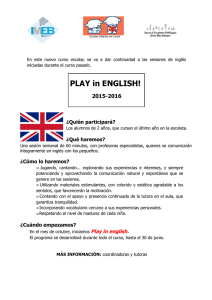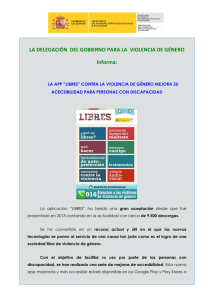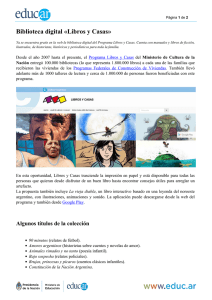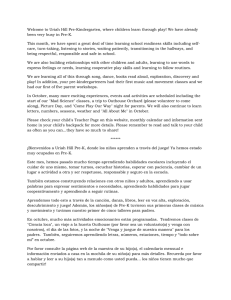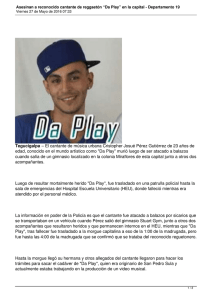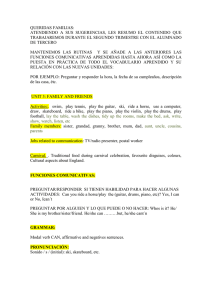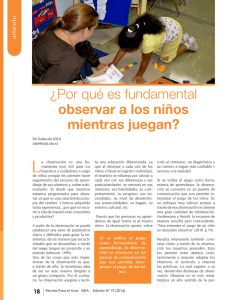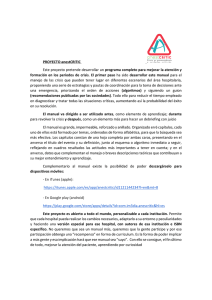Play: It`s the way young children learn
Anuncio
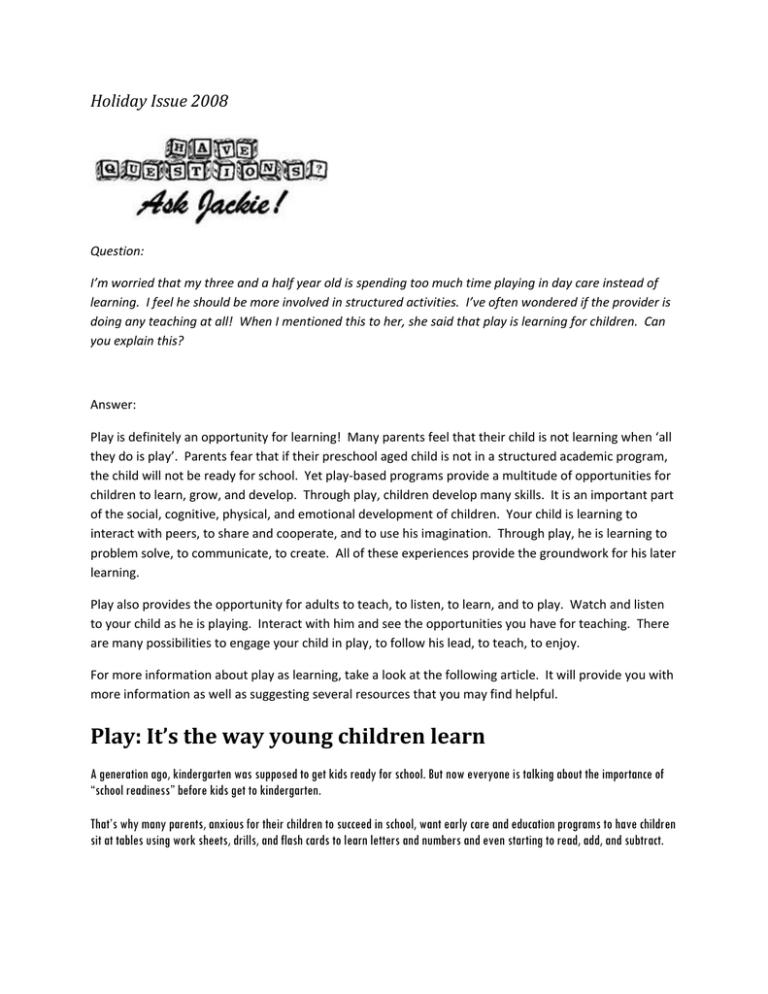
Holiday Issue 2008 Question: I’m worried that my three and a half year old is spending too much time playing in day care instead of learning. I feel he should be more involved in structured activities. I’ve often wondered if the provider is doing any teaching at all! When I mentioned this to her, she said that play is learning for children. Can you explain this? Answer: Play is definitely an opportunity for learning! Many parents feel that their child is not learning when ‘all they do is play’. Parents fear that if their preschool aged child is not in a structured academic program, the child will not be ready for school. Yet play‐based programs provide a multitude of opportunities for children to learn, grow, and develop. Through play, children develop many skills. It is an important part of the social, cognitive, physical, and emotional development of children. Your child is learning to interact with peers, to share and cooperate, and to use his imagination. Through play, he is learning to problem solve, to communicate, to create. All of these experiences provide the groundwork for his later learning. Play also provides the opportunity for adults to teach, to listen, to learn, and to play. Watch and listen to your child as he is playing. Interact with him and see the opportunities you have for teaching. There are many possibilities to engage your child in play, to follow his lead, to teach, to enjoy. For more information about play as learning, take a look at the following article. It will provide you with more information as well as suggesting several resources that you may find helpful. Play: It’s the way young children learn A generation ago, kindergarten was supposed to get kids ready for school. But now everyone is talking about the importance of “school readiness” before kids get to kindergarten. That’s why many parents, anxious for their children to succeed in school, want early care and education programs to have children sit at tables using work sheets, drills, and flash cards to learn letters and numbers and even starting to read, add, and subtract. But preschoolers learn differently from school-age children: play is essential to early learning. Play is the main way children learn and develop ideas about the world. It helps them build the skills necessary for critical thinking and leadership. It’s how they learn to solve problems and to feel good about their ability to learn. Children learn the most from play when they have skilled teachers who are well-trained in understanding how play contributes to learning. Most child development experts agree that play is an essential part of a high-quality early learning program. Play is not a break from learning—it’s the way young children learn. Play promotes school success in many ways Researchers are finding more and more connections between children’s play and the learning and social development that helps them succeed in school. For example, pretend play helps children learn to think abstractly and to look at things from someone else’s perspective. Pretend play is also connected to early literacy, mathematical thinking, and problem-solving. When children play: • They test their developing ideas with objects, people, and situations—the key ability for academic learning • They develop many kinds of skills together—physical, social, emotional, thinking, and language • They are doing things they are interested in, so they have a natural motivation to learn • They develop concepts and skills together. For example, as a child learns to write the letters in her name, she is also learning the concept that each letter represents a sound. And she is very motivated by the meaning—her own name! Children are more likely to remember skills and concepts they have learned by doing things that are meaningful to them • They learn from other children and develop social skills by playing together Parents can • Provide playthings that kids can use in a variety of ways: blocks, paper and crayons, dolls and toy animals, balls, playdough, etc. • Encourage kids to play with ordinary household objects like pots and pans and outdoor materials like sticks and grass • Provide simple playthings that encourage children to be active and use their imaginations, not to watch while the toy does tricks. • Play with your children, ask them questions about their play (“What are those animals doing?”), and point out things you notice (“You used a lot of bright colors in that picture!”) • Look for child care and preschool programs where children learn through play. Ask: How does this program use play to help children learn? This article originally appeared in the May-June 2007 issue of the Children's Advocate, published by Action Alliance for Children. For more about play and learning • Zero to Three has many brochures explaining the importance of play, with tips for understanding children’s play and ideas about how to make the most of play time. 202-638-1144, www.zerotothree.org • National Association for the Education of Young Children publishes Early Years are Learning Years, short articles for parents and child care providers, including many on “play and learning.” 800-424-2460, http://www.naeyc.org/ece/eyly/ • “Time for Play Every Day: It’s Fun and Fundamental,” Alliance for Childhood, www.allianceforchildhood.net/projects/ play/pdf_files/play_fact_sheet.pdf • The Importance of Play in Promoting Healthy Child Development and Maintaining Strong Parent-Child Bonds, from the American Academy of Pediatrics, discusses why play is essential to child development and what factors have reduced play. Includes recommendations for promoting the importance of play with families and in communities. Online at http://www.aap.org/pressroom/ playFINAL.pdf Next time: The teacher is key to play‐based learning Developing self control and social skills Pregúntele a Jackie. Pregunta: Estoy preocupada que mi niño de tres años pasa demasiado tiempo jugando en lugar de estar aprendiendo. Pienso que él debería estar más envuelto en actividades estructuradas. ¡Me pregunto a menudo si la proveedora enseña del todo! Cuando se lo mencioné, me dijo que el juego es aprendizaje para los niños. ¿Me puede explicar esto? Respuesta: ¡El juego es definitivamente una oportunidad para el aprendizaje! Muchos padres sienten que su hijo no está aprendiendo cuando ‘todo lo que hace es jugar’. Usted no es la única, muchos padres temen que si su niño de edad preescolar no está en un programa académico estructurado, el niño no va ha estar listo para la escuela, sin embargo, programas basados en el juego proveen múltiples oportunidades para que los niños aprendan, crezcan y se desarrollen. A través del juego, los niños adquieren muchas destrezas. Es una parte importante del desarrollo social, cognoscitivo, físico y emocional. Su niño está aprendiendo a interactuar con sus compañeros, a compartir, cooperar y a usar su imaginación. A través del juego él está aprendiendo a resolver problemas, a comunicarse, y a crear. Todas estas experiencias proveen la base para su aprendizaje posterior. El juego también provee a los adultos la oportunidad de enseñar, escuchar, aprender y jugar. Observe y escuche a su niño cuando está jugando, Interactúe con él y vea las oportunidades que tiene para enseñar. Hay muchas posibilidades para enlazar a su niño en juego, para seguir su pista, para enseñar y gozar. Para más información acerca del juego como aprendizaje, vea el artículo siguiente. Este le proveerá y sugerirá varios recursos que podrían serles útiles. acerca del juego como aprendizaje y le sugerirá varios recursos que podría encontrar útiles. ¡No se preocupe, juegue! Jugar: La manera de aprender de los niños pequeños Hace una generación, se suponía que el jardín de infancia preparaba a los niños para la escuela. Sin embargo, ahora todo el mundo habla sobre la importancia de la “preparación para la escuela” antes de que los niños lleguen al jardín de infancia. Esa es la razón por la que muchos padres, ansiosos de que a sus hijos les vaya bien en la escuela, quieren que los programas de cuidado y educación infantil temprana hagan que los niños se sienten a una mesa usando hojas de trabajo, fichas —tarjetas de ayuda pedagógica— y ejercicios para aprender letras y números, e incluso comenzar a leer, sumar y restar. Pero los preescolares aprenden de una forma diferente a la de los niños en edad escolar: jugar es esencial para el aprendizaje en la primera infancia. El juego es el vehículo más importante mediante el cual los niños aprenden y desarrollan ideas sobre el mundo. Jugar les ayuda a desarrollar las habilidades necesarias para el pensamiento crítico y el liderazgo, y es la forma en la que aprenden a resolver problemas y a sentirse bien con su capacidad de aprender. Los niños sacan mayor partido al aprendizaje a través del juego cuando tienen maestros con la formación y las herramientas necesarias, conocedores de cómo el juego contribuye al aprendizaje. La mayoría de los expertos están de acuerdo en que el juego constituye una parte esencial en un programa de aprendizaje para la primera infancia de alta calidad. El juego no es una interrupción en el aprendizaje: es la manera de aprender de los niños más pequeños. El juego contribuye al éxito escolar Los investigadores están encontrando cada vez más conexiones entre el juego de los niños y el aprendizaje y desarrollo social que les ayuda a obtener buenos resultados en la escuela. Por ejemplo, simular situaciones a través del juego ayuda a los niños a aprender a pensar de forma abstracta y a mirar las cosas desde otra perspectiva. Los juegos de simulación están asimismo relacionados con el aprendizaje de la lectura y la escritura, el pensamiento matemático y la resolución de problemas. Cuando los niños juegan… • Ponen a prueba el desarrollo de sus ideas a través de objetos, gente y situaciones, una habilidad clave para el aprendizaje académico. • Desarrollan varios tipos de aptitudes al mismo tiempo—físicas, sociales, emocionales, de pensamiento y de lenguaje. • Hacen cosas en las que están interesados y de esta forma tienen una motivación natural para aprender. • Desarrollan conceptos y aptitudes de forma conjunta. Por ejemplo, mientras una niña aprende a escribir las letras de su nombre, también está aprendiendo el concepto de que cada letra representa un sonido. Al mismo tiempo, está muy motivada por el significado: ¡su propio nombre! Los niños son más proclives a recordar habilidades y conceptos que han aprendido haciendo cosas que tienen algún tipo de significado para ellos. • Aprenden de otros niños y desarrollan herramientas sociales jugando juntos. Los padres pueden… • Dar a los niños juguetes que éstos puedan usar de muchas maneras: bloques, papel, ceras y lápices de colores, muñecas y animales de juguete, pelotas, pasta de modelar, etc. • Alentar a los niños a jugar con objetos domésticos cotidianos como ollas o sartenes, y materiales de exterior como palos o hierba. • Proporcionar juguetes simples que animen a los niños a ser activos y a usar su imaginación, y no a mirar cómo el juguete hace sus propios trucos. • Jugar con sus niños, hacerles preguntas sobre su juego (“¿Qué hacen aquellos animales?”), y señalar cosas que haya notado (“¡Usaste muchos colores brillantes en ese dibujo!”) • Buscar programas de preescolar y cuidado infantil donde los niños aprendan mediante el juego. Preguntar(se): ¿Cómo usa el juego este programa para ayudar a los niños a aprender? Este artículo fue publicado originalmente en el número de Mayo-Junio 2007 del periódico Defensor de los Niños, publicado por Action Alliance for Children. Más información sobre juego y aprendizaje • Los niños en su casa, un programa de televisión y sitio web con muchas ideas para realizar diversas actividades. Consulte el listado de programación local de PBS para averiguar horarios. Vaya a: www.losninosensucasa.org/index.php • Para educación a padres sobre la crianza de niños y educación para el cuidado infantil contáctese con su programa local de Los Primeros 5. Llamar al 916-263-1050. En Internet: www.ccfc.ca.gov Next Time: Usando el lenguaje y explicando historias Los maestros pueden… PARENTS! GRANDPARENTS! GUARDIANS! What is the KARE Crisis Nursery, and why would I want to use it? The KARE Crisis Nursery is a wonderful, warm home with trained, loving staff that are there for YOU in your time of crisis or emergency. Children aged 0 to 6 can stay at the Nursery for emergency day care or for 24 hour care at no charge, while their parents/guardians get the help they need. When you’re at the end of your rope, call us! We can help you tie a knot and hang on! 2652039, ask for Lynn or Liz.
